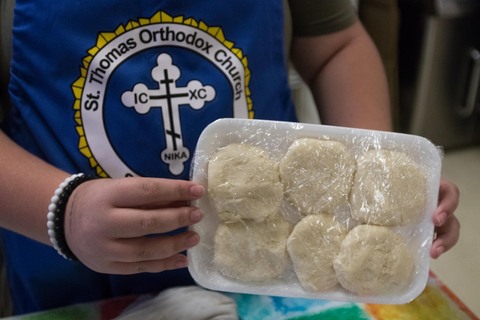
Mediterranean Delights: Iowa Ag Influences Syrian-Lebanese Church Dinner
Call it controlled chaos. Anyone who has ever helped with a church fundraising dinner knows just how hectic, harried and fun it can be to work together to prepare the meals. That’s especially true at St. Thomas Orthodox Church in Sioux City.
“It’s a lot of work and requires all hands on deck,” said Erica Stickney, a chairperson who helps coordinate St. Thomas’s popular Syrian-Lebanese dinner, which was held on Sept. 10 this year.
“While it can get a little frustrating at times when things get really busy and the kitchen’s hot, you remember that it’s about friendship and love, including love for God and the community.”
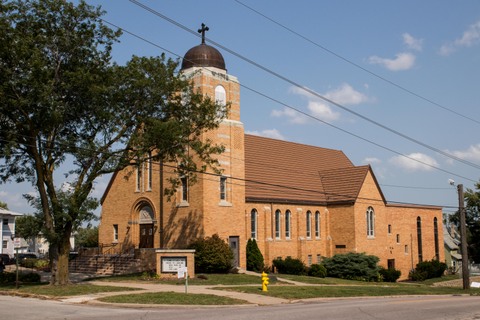
St. Thomas Orthodox Church has served the Sioux City community since 1916.
Homemade dinners at this year’s Syrian-Lebanese dinner, which was served from 12:30 p.m. to 6 p.m., cost $13 each, with a portion of the proceeds going to The Warming Shelter, a non-profit charity in Sioux City. While this year’s menu served plenty of Mediterranean favorites, many had a Midwestern twist. “Traditionally the meat would have been lamb, but we use beef, because we’re in Iowa,” Stickney said.
The menu included:
• Kibby (or kibbeh). This tasty meatloaf is made with lean ground beef and cracked bulgur wheat, seasoned with cinnamon and allspice.
• Yabrah. Much like cabbage rolls, yabrah includes cabbage leaves that are rolled and stuffed with a spiced blend of beef, rice and tomatoes. “We rolled 5,515 of these this year,” said Sue Stevens of Sioux City. “It’s rewarding to hear our guests say the cabbage rolls are perfect.”
• Lubee. This simple, yet satisfying side dish, features green beans in a tomato and meat sauce.
• Ruz. This Syrian favorite includes buttery white rice accented with tiny orzo pastas.
• Salata. This Syrian salad is enhanced with the church’s special dressing made of oil, vinegar, lemon juice and seasonings.
• Talamee. These big, round loaves of Syrian bread are indescribably tasty, report church members.
• Baklawa. Sometimes called baklava, this classic Mediterranean dessert is made with phyllo pastry dough, butter, and walnuts in a sweet syrup.
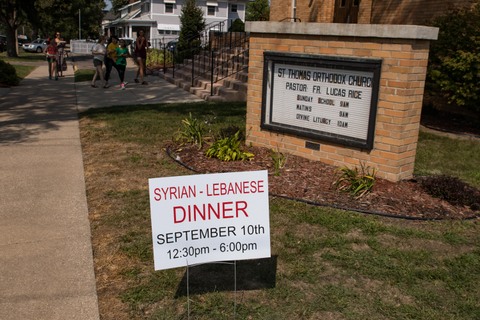
A steady stream of people stopped by St. Thomas Orthodox Church in Sioux City in September 2017 for the popular Syrian-Lebanese dinner.
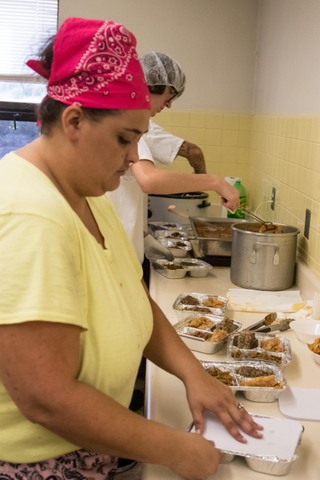
Erica Stickney, a chairperson who helps coordinate St. Thomas’s popular Syrian-Lebanese dinner in Sioux City, dished up countless carryout dinners.
Diverse influences create beloved traditions
While St. Thomas is located in the heart of Sioux City, the parish’s heritage, much like its dinner specialties, reflects a mix of Mediterranean and Midwestern influences. The church was founded in 1916 to serve the needs of Arab Christian immigrants, many of whom came to the area to work in the Sioux City Stockyards or local meatpacking plants. Today’s members embody a diverse background of Mediterranean, Russian, Serbian and Romanian heritage.
“Historically, Sioux City has been very welcoming and accepting of newcomers,” said Father Lucas Rice, who has served the St. Thomas parish more than six years. “When I came here, I was also blown away by how much the people of Siouxland love the St. Thomas church dinner.”
While no one’s sure exactly how long St. Thomas’s congregation has been hosting the dinner (anywhere from 50 years to nearly 80 years, depending on who you ask), there’s no doubt that people mourned the loss of the dinner when the church discontinued it for a few years.
“We hadn’t hosted the dinner in three years, because our church demographics were changing and the older generation was stepping down,” said Stickney, who noted that previous generations cooked without recipes and made their own phyllo dough. “The younger generation had to decide the next steps, and we decided to carry on the tradition.”
Before the older generation retired, younger cooks in the church worked side by side with the experienced cooks so they could observe each step of the process. “We would stop them as they added ingredients so we could determine the measurements and write the recipes,” Stevens said. “While we follow the recipes, we taste the food as we prepare it to make sure it’s right.”
Church members prepared to serve 1,400 dinners on Sept. 10. The process started three weeks before the dinner. “We begin by clarifying the butter,” said Stickney, who noted that 236 pounds of butter are used to prepare the cookies, rice and more. “Clarified butter has the milk solids removed and influences the taste and look of the food.”
The bread is baked on the Saturday right before the dinner, and the rest of the dishes are prepared fresh the day of the church dinner. “I love to come back for this dinner,” said Rick Stevens of Lincoln, Nebraska, whose family has been part of the St. Thomas parish for generations. “This is home.”
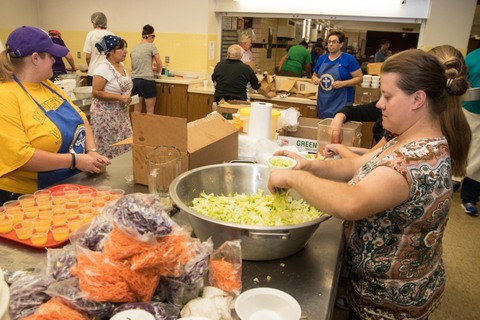
It’s all hands on deck in the basement kitchen at the St. Thomas Orthodox Church Syrian-Lebanese dinner and bake sale in Sioux City.
Clarified Butter
Slowly melt butter in pan on low heat. Be careful not to boil. When butter is completely melted, carefully skim all of the milk fat from the top and discard fat. The result is pure gold butter. This is used in most Arab recipes.
Ghraybeh (Lebanese Butter Cookies)
1 cup clarified butter
1 cup powdered sugar
2 cups flour
With hand mixer, whip butter until creamy pale and fluffy. Add sugar, and mix until fluffy. Using a large rubber spatula, blend in flour a little at a time.
Roll dough into balls and place on cookie sheet. Press to flatten. Work quickly so dough doesn’t get too soft. Bake in preheated oven (300 degrees) until cookies are firm, 10 to 12 minutes. Don’t let cookies get brown. Remove cookies from pan and let cool.
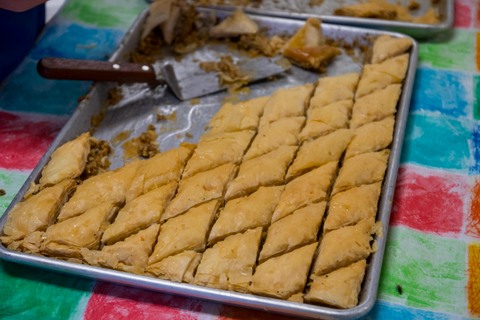
Homemade baklawa (baklava) is always in demand at the St. Thomas Orthodox Church Syrian-Lebanese dinner and bake sale.
Baklawa (also known as Baklava)
4 cups finely chopped walnuts
2 cups clarified butter-melted
1/8 cup granulated sugar
2 packages phyllo dough (20 sheets per package)
Combine walnuts with sugar and 1/4 cup butter so mixture forms a ball when squeezed in your hand.
Grease a large baking sheet with butter. Place one package of phyllo carefully on to baking sheet. Spread walnut mixture on top evenly. Carefully place second package of phyllo
on top of walnut mixture. Carefully take off top five layers of phyllo.
Butter the top layer of phyllo dough on the pan, and then place a single layer of phyllo on top of buttered layer. Repeat until all lawyers are back on to pan. Put butter on top layer. Cut into diamond shapes.
Bake in preheated, 375-degree oven for 25 minutes. Remove from oven. Pour a little butter on the top evenly. Place pan back into the oven for another 20 minutes or so, until the baklawa is golden brown.
Remove pan from oven and place on cooling rack. Immediately pour syrup mix (see recipe below) evenly on top of entire pan. Let pan sit for one day. Allow syrup to soak through the entire dessert. You may want to re-cut baklawa before removing from pan.
Syrup for Baklawa
2 1/2 cups granulated sugar
1 1/2 cups water
1 tablespoon lemon juice
In a pan, heat water and sugar until boiling. Once mixture starts to boil, add the lemon juice. Cook for another 15 minutes until the syrup starts to thicken. Remove pan from heat, and set aside to cool.
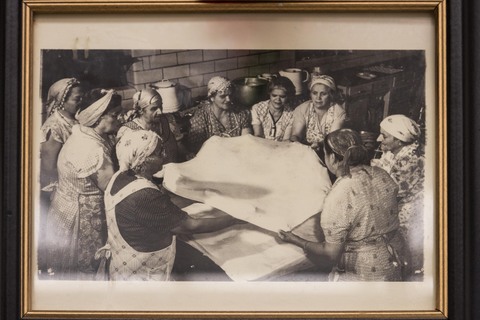
Previous generations of church members made their own phyllo dough at St. Thomas Orthodox Church in Sioux City, Iowa.
Barazek (Sesame Cookies)
1 cup butter
1/2 cup sugar
1 egg
1/2 teaspoon vanilla
3 cups flour
1/4 teaspoon salt
1 teaspoon baking powder
1/2 cup milk
3 tablespoons pistachios chopped
1 egg white
3 tablespoons sesame seeds
Preheat oven to 350 degrees. Cream butter and sugar with electric mixer until light and fluffy. Add egg and vanilla, continue beating. In separate bowl, mix flour, salt and baking powder. Stir flour mixture gradually into butter mix, alternating with milk.
Knead dough on lightly floured surface. Divide dough into two parts. Roll each piece into a circle, and cut into rounds. Place pistachios on a cookie sheet; spread evenly. Place dough rounds on top of pistachios, and press lightly. Beat the egg bite and then brush the tops of cookies. Sprinkle with sesame seeds. Bake about 15 minutes, or until golden brown.
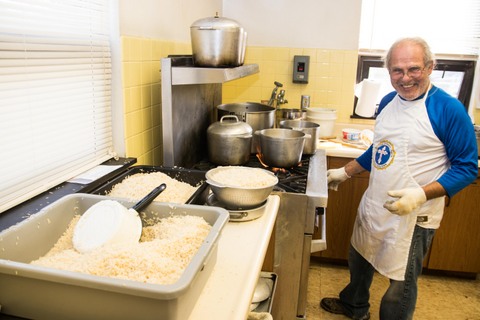
Ruz (a Syrian favorite of buttery white rice accented with tiny orzo pastas) is cooked in large quantities at the St. Thomas Orthodox Church Syrian-Lebanese dinner.
Want more?
Thanks for stopping by. I invite you to read more of my blog posts if you want more more intriguing Iowa stories and history, along with Iowa food, recipes and tips to make you a better communicator.
If you like what you see and want to be notified when I post new stories, be sure to click on the “subscribe to blog updates/newsletter” button at the top of this page. Feel free to share this information with friends and colleagues who might be interested, too.
If you’re hungry for more stories of Iowa history, check out my top-selling “Culinary History of Iowa: Sweet Corn, Pork Tenderloins, Maid-Rites and More” book from The History Press. Also take a look at my latest book, “Dallas County,” and my Calhoun County” book from Arcadia Publishing. Both are filled with vintage photos and compelling stories that showcase he history of small-town and rural Iowa. Order your signed copies today! Iowa postcards are available in my online store, too.
Let’s stay in touch. I’m at darcy@darcymaulsby.com, and yettergirl@yahoo.com.
P.S. Thanks for joining me. I’m glad you’re here.
@Copyright 2017 Darcy Maulsby & Co.
8 responses to “Mediterranean Delights: Iowa Ag Influences Syrian-Lebanese Church Dinner”
Recent Posts
- Do Press Releases Still Work?
- Erasing History? Budget Cuts Threaten to Gut Ag History at Iowa State University
- Machines that Changed America: John Froelich Invents the First Tractor in Iowa
- Bob Feller on Farming, Baseball and Military Service
- Classic Restaurants of Des Moines: A Taste of Thailand Served the "Publics" and Politics
- Want to Combat Fake News? Become a Better Researcher
Categories
- Achitecture
- Agriculture
- Architecture
- baking
- barbeque
- Barn
- breakfast
- Business
- Communication Tips
- Conservation
- content
- cooking
- Crime
- Dallas County
- Economical
- Farm
- Featured
- Food
- Food history
- health
- Iowa
- Iowa food
- Iowa history
- marketing
- Photography
- Recipes
- Seasonal
- Small town
- Storytelling
- Uncategorized
- writing
Archive by year
- 2023
- 2022
- 2021
- 2020
- When Agriculture Entered the Long Depression in the Early 1920s
- The Corn Lady: Jessie Field Shambaugh and the Birth of 4-H in Iowa
- Sauce to Sanitizer: Cookies Food Products Bottles Hand Sanitizer Made with Ethanol
- Myth Busting: No, Your Pork Doesn't Come from China
- Long Live Print Newsletters! 5 Keys to Content Marketing Success
- Shattering Silence: Farmer Helped Slave Find Freedom and Racial Equality in Iowa
- Meet Iowa Farmer James Jordan, Underground Railroad Conductor
- George Washington Carver Rose from Slavery to Ag Scientist
- Remembering the African-American Sioux City Ghosts Fast-Pitch Softball Team
- Want to Combat Fake News? Become a Better Researcher
- Classic Restaurants of Des Moines: A Taste of Thailand Served the "Publics" and Politics
- 2019
- The Untold Story of Iowa’s Ag Drainage Systems
- Stop Rumors Before They Ruin Your Brand
- Finding Your Voice: The Story You Never Knew About "I Have a Dream"
- Warm Up with Homemade Macaroni and Cheese Soup
- Can a True Story Well Told Turn You into a Tom Brady Fan?
- Baking is for Sharing: Best Bread, Grandma Ruby’s Cookies and Other Iowa Favorites
- 4 Key Lessons from Bud Light’s Super Bowl Corn-troversy
- Could Your Story Change Someone’s Life?
- What To Do When the Travel Channel Calls
- Tex-Mex Sloppy Joes and the Magic of Maid-Rite in Iowa
- How Not to Invite Someone to Your Next Event--and 3 Solutions
- We Need FFA: Iowa Ag Secretary Mike Naig Reflects on His FFA Experiences
- From My Kitchen to Yours: Comfort Food, Conversation and Living History Farms
- Smart Marketing Lessons from an Uber Driver--Listen Up!
- Hog Trailers to Humidors: Two New Iowa Convenience Stores Reflect “Waspy’s Way”
- A Dirty Tip to Make Your Social Media Content More Shareable
- Are You on Team Cinnamon Roll?
- Senator Grassley on Farming: Any Society is Only Nine Meals Away From a Revolution
- Why We Should Never Stop Asking Why
- What’s the Scoop? Expanded Wells’ Ice Cream Parlor Offers a Taste of Iowa
- Independence, Iowa’s Connection to the Titanic and Carpathia
- Memories of Carroll County, Iowa, Century Farm Endure
- Iowa's “Peacemaker Pig” Floyd of Rosedale Helped Calm Racial Tensions
- 2018
- How to Cook a Perfect Prime Rib
- How Did We Get So Rude?
- Mmm, Mmm Good: Soup’s on at the Rockwell City Fire Department
- Quit Using “Stupid Language”
- In Praise of Ham and Bean Soup
- Recalling a Most Unconventional—and Life-Changing--FFA Journey
- Events Spark Stories That Help Backcountry Winery Grow in Iowa
- Sac County Barn Quilt Attracts National Attention
- Doing Good, Eating Good at Lytton Town Night
- Young Entrepreneur Grows a Healthy Business in Small-Town Iowa
- Digging Deeper: Volunteers Showcase Thomas Jefferson Gardens in Iowa
- How to Tell Your Community’s Story—with Style!
- DNA Helps Sailor Killed at Pearl Harbor Return to His Family
- It’s Time to Be 20 Again: Take a Road Trip on Historic Highway 20
- The Biggest Reason You Shouldn’t Slash Your Marketing Budget in Tough Times
- Are You Telling a Horror Story of Your Business?
- Pieced Together: Barn Quilt Documentary Features Iowa Stories
- Unwrapping Storytelling Tips from the Candy Bomber
- Barn Helped Inspire Master Craftsman to Create Dobson Pipe Organ Builders
- Butter Sculptures to Christmas Ornaments: Waterloo Boy Tractor Celebrates 100 Years
- Ag-Vocating Worldwide: Top 10 Tips for Sharing Ag’s Story with Consumers
- 2017
- Growing with Grow: Iowa 4-H Leader Guides 100-Year-Old 4-H Club for 50 Years
- High-Octane Achiever: Ethanol Fuels New Driver Tiffany Poen
- Shakespeare Club Maintains 123 Years of Good Taste in Small-Town Iowa
- Iowa’s Ice Queen: Entrepreneur Caroline Fischer’s Legacy Endures at Hotel Julien Dubuque
- Darcy's Bill of Assertive Rights: How to Communicate and Get What You Need
- Celebrating Pi Day in Iowa with Old-Fashioned Chicken Pot Pie
- Cooking with Iowa’s Radio Homemakers
- Top 10 Tips to Find the Right Writer to Tell Your Company’s Stories
- The “No BS” Way to Protect Yourself from Rude, Obnoxious People
- Learning from the Land: 9 Surprising Ways Farmers Make Conservation a Priority
- Leftover Ham? Make This Amazing Crustless Spinach and Ham Quiche
- Iowa’s Lost History from the Titanic
- Coming Soon--"Dallas County," a New Iowa History Book!
- How to Clean a Burned Pan in 6 Simple Steps
- Iowa Beef Booster: Larry Irwin Takes a New Twist on Burgers
- Get Your Grill On: How to Build a Better Burger
- "Thank God It’s Over:" Iowa Veteran Recalls the Final Days of World War 2
- How to Thank Veterans for Their Military Service
- Imagine That! Writers, Put Your Reader Right in the Action
- Remembering Ambassador Branstad’s Legacy from the 1980s Farm Crisis in Iowa
- Busting the Iowa Butter Gang
- Lightner on Leadership: “Everyone Has Something to Give”
- Show Up, Speak Up, Don’t Give Up
- Small - Town Iowa Polo Teams Thrilled Depression - Era Crowd
- Ethanol:Passion by the Gallon
- Cruising Through Forgotten Iowa History on Lincoln Highway
- Why I'm Using a Powerful 500-Year-Old Technology to Make History--And You Can, Too
- 5 Ways a “History Head” Mindset Helps You Think Big
- Behind the Scene at Iowa's Own Market to Market
- Let’s Have an Iowa Potluck with a Side of History!
- Iconic State Fair Architecture: Historic Buildings Reflect Decades of Memories
- Iconic State Fair Architecture- Historic Buildings Reflect Decades of Memories
- Iowa Underground - How Coal Mining Fueled Dallas County's Growth
- Ultra-Local Eating: Jennifer Miller Guides CSA, Iowa Food Cooperative
- The Hotel Pattee and I are Hosting a Party—And You’re Invited!
- Tell Your Story—But How?
- Mediterranean Delights: Iowa Ag Influences Syrian-Lebanese Church Dinner
- 6 Steps for More Effective and Less Confrontational Conversations
- 6 Steps for More Effective and Less Confrontational Conversations!
- 6 Ways to Motivate Yourself to Write—Even When You’re Not in the Mood
- Always Alert-How to Stay Safe in Any Situation
- Does Accuracy Even Matter Anymore?
- Soy Power Shines at Historic Rainbow Bridge
- Free Gifts! (Let’s Talk Listening, Stories and History)
- 2016
- How to Connect with Anyone: Lessons from a Tornado
- Soul Food: Lenten Luncheons Carry on 45-Year Iowa Tradition
- Top 3 Tips for Writing a Must-Read Article
- Darcy's Top 10 Tips to Better Writing
- Top 8 Tips for Building a Successful Freelance Business
- 10 Steps to Better Photos
- Reinventing the Marketer of 2010
- Extreme Writing Makeover
- My Top Social Media Tips for Farmers: REVEALED!
- Honoring the Legacy of Rural Iowa's Greatest Generation
- Iowa's Orphan Train Heritage
- Dedham’s Famous Bologna Turns 100: Kitt Family Offers a Taste of Iowa History
- Iowa Barn Honors Pioneer Stock Farm
- Darcy's Top 10 Tips for Better Photos
- Soup and Small-Town Iowa Spirit
- Savoring the Memories: Van's Café Served Up Comfort Food for Six Decades
- Mayday, Mayday—The Lost History of May Poles and May Baskets in Iowa
- Iowa's Vigilante Crime Fighters of the 1920s and 1930s
- Very Veggie: Iowan's Farm-Fresh Recipes Offer Guilt-Free Eating
- Iowa Public TV's "Market to Market" Features Expedition Yetter, Agri-Tourism, Des Moines Water Works' Lawsuit
- 62 Years and Counting: Calhoun County, Iowa, Families Maintain 4th of July Picnic Tradition
- “A Culinary History of Iowa” Satisfies: Iowa History Journal Book Review
- For the Love of Baking: Lake City's Ellis Family Showcases Favorite Iowa Farm Recipes (Caramel Rolls, Pumpkin Bars and More!)
- Remembering Sept. 11: Iowa Community’s Potluck Honors America
- Talking Iowa Food and Culinary History on Iowa Public Radio
- Talking "Stilettos in the Cornfield," Taxes, Trade and More on CNBC
- FarmHer #RootedinAg Spotlight--FFA Attracts More Women to Careers in Ag
- Rustic Cooking Refined: Iowan Robin Qualy Embraces Global Flavors
- Voice of Reason: Iowa Pork Producer Dave Struthers Offers Top 10 Tips to Speak Up for Ag
- Iowa Eats! Why Radio Iowa, Newspapers and Libraries are Hungry for "A Culinary History of Iowa"
- Iowa Turkeys Carry on National Thanksgiving Tradition
- Riding with Harry: 2016 Presidential Election Reflects Truman's Iowa Revival at 1948 Plowing Match in Dexter
- All Aboard! Rockwell City’s “Depot People” Offer a Taste of Iowa History
- Is This Iowa's Favorite Appetizer?
- O, Christmas Tree! Small Iowa Towns Celebrate with Trees in the Middle of the Street
- Slaves Escaped Through Dallas County on Iowa’s Underground Railroad
- Adel Barn Accents Penoach Winery in Iowa
- Celebrating New Year's Eve in Style at a Classic Iowa Ballroom

Great article. Learned a lot about the church and recipes. It is good how everyone works together.
Yes, it is great how everyone works together to make this church dinner such a success for the community. Glad you enjoyed the article, Pigeon! Feel free to share the link to this blog post on Facebook and with your friends.
Thank you for your post Darcy..I hope the fundraiser was very successful.
Yes, I think the church was very pleased with the success of their fundraiser, Juanita!
Delightful! I’ve watch Bosnians roll out phyllo dough for pita and burek, but never one that big!
Impressive, isn’t it? Those old-school cooks knew their way around a kitchen!
I’m so glad the younger generation understood that their dinner was a part of their church’s tradition and needed to be continued. It’s wonderful how they were mentored by the older generation, and how the younger generation pitched in to learn the necessary skills to allow them to keep these recipes from becoming only memories of the past. Great article and thanks for sharing.
Thanks so much, Pam! I agree! So glad you enjoyed the article.